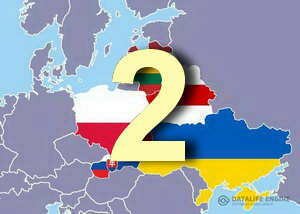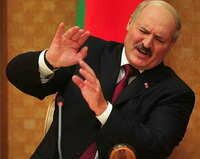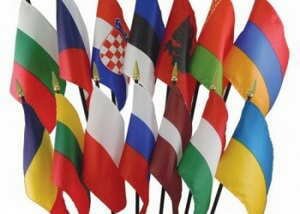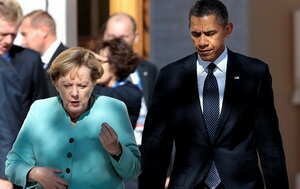
Oleksiy Volovych
Ukraine's Potential as a Part of the BBSU
Our country, despite the fact that it has now plunged into an economic crisis, does have quite a powerful economic potential, thanks to which it can claim a leading position in the future BBU. In the post-Soviet space, Ukraine is second after Russia in terms of population, economic and scientific-technical potential. And by the size of the territory it is the largest country in Europe. In terms of GDP, Ukraine is second in Central-Eastern Europe after Poland. By the available scientific potential, it has one of the leading places in Europe. In particular, it is ranked among the top five world leaders in the field of IT-products, with the highest number of computer programmers with diplomas.
 Ukraine is still in the top five countries with the latest technologies and in the aerospace sphere. Provided the proper investments, Ukraine has all opportunities to develop aerospace engineering to launch satellites. Shipyards of Mykolaiv and Kherson can build a variety of vessels, including tankers, which are now extremely scarce. Ukraine owns a third of the world black soils and is Europe's breadbasket. Ukraine consistently takes 7-8th place in the world in the export of weapons.
Ukraine is still in the top five countries with the latest technologies and in the aerospace sphere. Provided the proper investments, Ukraine has all opportunities to develop aerospace engineering to launch satellites. Shipyards of Mykolaiv and Kherson can build a variety of vessels, including tankers, which are now extremely scarce. Ukraine owns a third of the world black soils and is Europe's breadbasket. Ukraine consistently takes 7-8th place in the world in the export of weapons.
According to international experts, Ukraine ranks first in Europe in terms of ratio of transit. And all this thanks to both, its favorable geographical location in the center of Europe, and a well-developed system of land and water transport routes.
We believe that using the geo-strategic position and Ukraine's unique opportunities as a transit country for energy resources from Azerbaijan, Kazakhstan, Turkmenistan, Iraq and Iran to Europe, the Ukrainian government should work out a set of political, economic, scientific and technological measures, aimed at the practical delivery to Ukraine of hydrocarbons from the countries just mentioned. We should as soon as possible return to the gas pipeline projects, mainly from Iran and Iraq through Turkey, Black Sea, Ukraine and further to Europe. In this case, Turkey has more advantages (as a transit country) compared with the countries of the Caucasus, where Russia and its Gazprom have quite a significant impact.
Among the most promising large-scale Polish-Ukrainian joint projects we can't help mentioning the project of joining the Ukrainian gas transportation system (GTS) to the European gas corridor “North — South” by building interconnector Ukraine — Poland, which will let Ukraine to the European gas market, as well as to the capacities of the Polish LNG-terminal near Swinoujscie.
Ukraine cannot be considered a full-fledged sovereign state because of its dependence on Russian energy carriers. Ukraine's best response to Russia's challenges in the energy sphere should be a continuation of ongoing efforts to diversify the sources and routes of energy supplies to Ukraine. The main ways of implementing this goal should be buying oil and gas from the Caspian region, Central Asia and the Middle East.
The Expert Community's Role in the Implementation of the BBSU Project
Recently, experts from Ukraine, Poland, Latvia and other countries pay great attention to the project of the BBSU. For example, in November 2010 Vilnius hosted an International Scientific Conference “New Region of Europe: Paradigms of Regional Development in the Baltic-Black Sea Region”, where politicians, experts and analysts from Poland, Lithuania, Belarus, Moldova, Ukraine, Hungary and other countries discussed the prospects of creation of the Baltic-Black Sea Union.
In September 2014, an International Conference was held at the National University “Ostroh Academy” on the occasion of the 500th Anniversary of the victory of the united forces of the Grand Duchy of Lithuania and Kingdom of Poland under the leadership of Prince Constantine Ostroh over troops of Moscow principality September 8, 1514, near the city of Orsha on the Dnieper. The participants of the Conference adopted an appeal to President P. Poroshenko with a proposal to consider the possibility of creating the Baltic-Black Sea alliance consisting of Ukraine, Poland and Lithuania, with the right to accession by other States.
November 12, 2015, Kyiv hosted the Baltic-Black Sea Forum, organized by the NGO “International Initiative to Support Ukraine” in cooperation with the Foundation “The Baltic-Black Sea Security Confederation” (Lithuania). The event resulted in two institutional initiatives: creation of information and culture, security and economic association of nations — the “Baltic-Black Sea Commonwealth”, and activation of the Inter-parliamentary Assembly of Poland, Lithuania and Ukraine with the permanently working body — the Secretariat. It has to promote international and information cooperation of political forces and public organizations that have determined the goal to strengthen the Baltic-Black Sea integration.
 In February 2015, Ukraine created a public organization the “Baltic-Black Sea Confederation” (www.bbsc.eu), the main purpose of which is formation of civil structures of a socio-economic platform for the construction of interstate association of countries of the Baltic and the Black Sea with the participation of peoples living in historical territories of the Rzeczpospolita and Grand Duchy of Lithuania — now Poland, Lithuania, Latvia, Belarus, Moldova, Ukraine, etc. The main goal of the Association is the resumption of transit -transport, economic, financial, commercial, spiritual and cultural, social and military co-operation between the East and the West, the North and the South of Europe to ensure the national interests of the countries of the Confederation. The founders of the NGO BBSU hope that the powerful interstate association jointly established by the Baltic and Black Sea regions, will contribute to the economic development of the countries of the Intermarium, and to their cultural growth and social welfare of the peoples of the region.
In February 2015, Ukraine created a public organization the “Baltic-Black Sea Confederation” (www.bbsc.eu), the main purpose of which is formation of civil structures of a socio-economic platform for the construction of interstate association of countries of the Baltic and the Black Sea with the participation of peoples living in historical territories of the Rzeczpospolita and Grand Duchy of Lithuania — now Poland, Lithuania, Latvia, Belarus, Moldova, Ukraine, etc. The main goal of the Association is the resumption of transit -transport, economic, financial, commercial, spiritual and cultural, social and military co-operation between the East and the West, the North and the South of Europe to ensure the national interests of the countries of the Confederation. The founders of the NGO BBSU hope that the powerful interstate association jointly established by the Baltic and Black Sea regions, will contribute to the economic development of the countries of the Intermarium, and to their cultural growth and social welfare of the peoples of the region.
In order to find strategic partners, the NGO BBSC participates and itself acts as the initiator of the thematic scientific conferences, round tables, as well as consultations with Governments, national platforms, non-governmental organizations in countries of Intermarium, first of all with Poland and Lithuania, on joint priorities in different spheres of political, social and economic life.
 May 20, 2016, in an interview with TV channel “Rada”, the Speaker of the Verkhovna Rada Andriy Parubiy proposed creation of the Baltic-Black Sea Union. He said this after his meeting on May 16, with the head of the Polish-Ukrainian Friendship Group in the Parliament of the Republic of Poland Michal Dvorchik. According to A. Parubiy, “Ukraine should become one of the centers of decision-making, one of the centers of influence as a great powerful state”. A. Parubiy believes that “the idea of the Baltic-Black Sea Union, as one of the formats of Ukraine's European integration, is extremely promising and important for our country.”
May 20, 2016, in an interview with TV channel “Rada”, the Speaker of the Verkhovna Rada Andriy Parubiy proposed creation of the Baltic-Black Sea Union. He said this after his meeting on May 16, with the head of the Polish-Ukrainian Friendship Group in the Parliament of the Republic of Poland Michal Dvorchik. According to A. Parubiy, “Ukraine should become one of the centers of decision-making, one of the centers of influence as a great powerful state”. A. Parubiy believes that “the idea of the Baltic-Black Sea Union, as one of the formats of Ukraine's European integration, is extremely promising and important for our country.”
Historical Negative Accretions and Obstacles
The difficulties in the way of creation of the BBSU include differences in the interpretation of some historical events, and the ethnocentric vision of the functioning of the BBSU that is most characteristic of certain Polish and Ukrainian geopolitical scientists. Now, there are differences in Ukraine and Poland's interpretation of the Volyn tragedy of 1943 and the activities of the UPA, and this in a certain way complicates both the intergovernmental and inter-ethnic dialogue. Certain problems also remain in relations between the Polish national minority living in the territory of Wilna Region, the Lithuanian state power and the Lithuanian population. It is obvious that within the next few years it will be difficult to reach consensus or full understanding of these and other historical issues and disputes in the relationships between Poles, Ukrainians, Lithuanians and Belarusians, especially in the situation where these problems and disputes are artificially fueled by the Kremlin agents. It seems that the most appropriate and best step in this context would be not touching upon these issues in the course of discussions on the creation of the Baltic-Black Sea alliance.
 Another problem is the Lukashenko's Belarus' attitude to the hypothetical union of Eastern European States, since Lukashenko's regime in its transformation and distancing itself from Moscow will hardly go far enough to begin to perceive the project of BBSU positively. On the other hand, the BBSU project is in conflict with the project of formation of the “union state” with Russia. However, we cannot exclude a possibility that A. Lukashenko will balance between the two projects in order to get additional dividends, playing on contradictions between Russia and the countries of Intermarium. Of course, much will depend on the Intermarium countries' leaders' skills, especially of Lithuania, Poland and Ukraine, to establish a dialogue with A. Lukashenko, using some improvement in relations between Brussels and Minsk. For example, if A. Lukashenko is offered to place the headquarters of the BBSU in Minsk, he will hardly be able to resist the temptation to become a formal leader of the union of Eastern European States.
Another problem is the Lukashenko's Belarus' attitude to the hypothetical union of Eastern European States, since Lukashenko's regime in its transformation and distancing itself from Moscow will hardly go far enough to begin to perceive the project of BBSU positively. On the other hand, the BBSU project is in conflict with the project of formation of the “union state” with Russia. However, we cannot exclude a possibility that A. Lukashenko will balance between the two projects in order to get additional dividends, playing on contradictions between Russia and the countries of Intermarium. Of course, much will depend on the Intermarium countries' leaders' skills, especially of Lithuania, Poland and Ukraine, to establish a dialogue with A. Lukashenko, using some improvement in relations between Brussels and Minsk. For example, if A. Lukashenko is offered to place the headquarters of the BBSU in Minsk, he will hardly be able to resist the temptation to become a formal leader of the union of Eastern European States.
One of the main obstacles in the way to the realization of the idea of the Baltic-Black Sea Union is our military-political confrontation with Russia due to Russia's aggression in the Crimea and the Donbas. The fall of the Ukrainian economy in the 25th year of Ukraine's independence, a deep political crisis, particularly in the Parliament, poor conduct of effective reforms, rampant corruption at different levels of the Ukrainian government, the total impoverishment of the people in no way contribute to Ukraine's joining the BBSU. The so-called Minsk Agreements on the settlement of the situation in the Donbas, which became a consequence of the German-Russian compromise at the expense of Ukraine's national interests, show the inferiority of subjective geostrategic thinking of the Ukrainian political leadership. At the same time, the current Ukrainian government will be able to rectify the situation and to defend Ukraine's national interests only if our country is actively supported by Intermarium countries.
The weak point of most of the concepts of creating the BBSU is a too large number of countries with multi-directional vectors of geopolitical gravity, which negatively affects the stability of this hypothetical project. In particular, bringing to the BBSU project the countries of the former Yugoslavia seems to be problematic and unrealistic, if we take into consideration the fact that the level of their reintegration after the collapse of Yugoslavia in the early 1990s is quite low.
Legal Aspects of the Implementation of the BBSU Project
Some political scientists are skeptical about the possible uniting of Lithuania and Poland with Ukraine into a confederation or union, because both the countries are members of the European Union and NATO. However, according to the NATO Charter and the Treaty on European Union, there is no functioning legal rules, which would prevent it. Constitutions of Lithuania and Poland directly provide for a possibility of multilateral treaties on joining different international associations, unions, and confederations and so on. Besides, creation of a confederation or interstate union is possible in accordance with the UN Charter, the Declaration on Principles of International Law and the Vienna Convention on International Treaties, taking into account the provisions of agreements on the European Union. Thus, the existing international law allows individual member states of the European Union and NATO to be members of the International Organization of the Baltic-Black Sea Union without the procedure of agreeing its accession with the EU member states.
 In Europe, there have already been precedents when next to the European Union there were other military-political and economic organizations. This refers to the created in 1948, the Western European Union, which ceased its activity in June 2011.
In Europe, there have already been precedents when next to the European Union there were other military-political and economic organizations. This refers to the created in 1948, the Western European Union, which ceased its activity in June 2011.
To form the union of the Baltic-Black Sea region countries, Ukraine must sign an international agreement with countries-participants, which, in accordance with the Law of Ukraine, may be ratified in the Parliament by a qualified majority of its constitutional composition, or adopted by a national referendum. Besides, at the constitutional level we should settle the question of the co-relation of national and supranational Law through an introduction into the Constitution of Ukraine of a norm, which would provide for the superiority of the international law over the national one. So, in Ukraine there is a need to make constitutional changes that will create the necessary legal conditions for the country's participation in the inter-state union or confederation.
The USA and EU's Attitude to the BBSU Project
Famous American geo-political scientist Zbigniew Brzezinski argued that the USA is interested in the Baltic-Black Sea Union as a belt locking Russia with its expansionist intentions in Asia and Europe. The head of an influential US company Stratfor, dealing with global intellectual intelligence and strategic forecasting, George Friedman also put forward the concept of geopolitical Intermarium (Land between the Seas) in order to prevent the spread of Russian influence on the continent of Europe. According to George Friedman, the locomotive of this alliance should be Poland, Ukraine, Lithuania, Romania and Azerbaijan. According to G. Friedman, common geopolitical interests of these countries will help their being united in a military alliance with the USA's support. G. Friedman believes that the new strategy will enable the United States to use the capabilities of its Eastern European allies to strengthen its positions in Europe.
The attitudes of the leading countries of the European Union and the United States to the hypothetical project of the Baltic-Black Sea Union differ greatly. While Washington in general supports the project, the same cannot be said about Berlin, Paris and even London, which has traditionally been more focused on Washington than on Brussels. In a way, it can be explained by some difficulties in the USA's dialogue with France and Germany, as well as by internal problems in the EU that have emerged lately. These problems include the issue of Great Britain's membership in the EU, which is a major concern in Washington as Great Britain's possible leaving the European Union may disrupt the global balance of power in the EU between London, Paris and Berlin.
On the other hand, the signing of the Transatlantic Trade and Investment Partnership Agreements (TTIP) between the European Union and the United States keeps being delayed. Moreover, the leading European countries' communities' attitude to TTIP is becoming more and more negative. Thus, according to the results of recent polls in Germany, the number of Germans, positively assessing this Agreement, has decreased from 55 % in 2014 to 17 % at present. After 12 rounds of negotiations, France's attitude to the TTIP is steadily negative.
 There is no full understanding and cooperation between Washington, Paris and Berlin, in the matters of implementation of the Minsk Agreements in the Donbas. Thus, in the end of April 2016, US President Barack Obama, talking to German Chancellor Angela Merkel at the international industrial fair in Hannover, asked her to expand the “Normandy Format” of negotiations to resolve the situation in the Donbas by Washington's participation, but heard a “polite refusal.”
There is no full understanding and cooperation between Washington, Paris and Berlin, in the matters of implementation of the Minsk Agreements in the Donbas. Thus, in the end of April 2016, US President Barack Obama, talking to German Chancellor Angela Merkel at the international industrial fair in Hannover, asked her to expand the “Normandy Format” of negotiations to resolve the situation in the Donbas by Washington's participation, but heard a “polite refusal.”
Disappointed with the lack of sufficient loyalty on the part of France and Germany, as well as not excluding Great Britain's exit from the European Union, Washington, in its European policy relies on the countries of Eastern Europe and especially on Poland, Romania and the Baltic countries. The draft US defence budget for 2017 includes 3.4 billion US dollars for the expansion of USA's military presence in Eastern Europe and providing direct military assistance to countries in the region. US Senate proposes to provide in the draft budget for 2017 fiscal year 500 million US dollars to help Ukraine with lethal weapons included.
So, there is no doubt that the USA will support the project of the Baltic-Black Sea Union, if implemented, which cannot be said about the German-French tandem, which in case of creation of a powerful geopolitical center in Intermarium will noticeably lose its leading positions in Europe.
***
Today, when in the West and in the East of a Great Europe, there are two blocks of states — the European Union and the Eurasian Economic Union — there is, in our opinion, an urgent need for a “middle” association — the Baltic- Black Sea Alliance — composed of the states of Central and Eastern Europe, that would be a sub-regional component of the European Union and NATO.
The core of the Baltic-Black Sea Alliance could be a confederal state consisting of Ukraine, Poland, Lithuania and later Belarus. Eastern European countries' active participation in the BBSU would meet the interests of all European countries, as this would contribute to further strengthening of Europe as a powerful geopolitical center. On the other hand, development of the BBSU in a certain way would meet the American concept of strengthening the “young Europe”.
Establishment of allied relations between the countries of Intermarium can give a powerful impetus to their economic development by attracting new markets and co-operation between Europe and Asia using the Silk Road. Ukraine could become one of the drivers of the future geopolitical association. If within the nearest 2-3 years Poland, Lithuania, Belarus and Ukraine manage to form the nucleus of the future Baltic-Black Sea Union, then in 10-15 years the new geopolitical formation by its economic and military potential will reach the level of Germany, Great Britain and France taken together and will surpass Russia.
The military alliance of only Ukraine and Poland with a total strength of the armed forces from 400 to 500 thousand military servicemen and the total military budget of 16 to 20 billion US dollars will be the most powerful military force in Europe and, based on the deployment of missile defence systems on their territory, will play a leading role in NATO's military policy.
In our opinion, the project of the Baltic-Black Sea Union could contribute to realization of the following tasks:
- to neutralize Russia's attempts to consider post-Soviet countries as the scope of its particular interests and play a messianic role in the post-Soviet space;
- to work out common approaches, forms and methods of gradual unification of Eastern and Western Europe on the basis of pan-European (and not only Western) democratic integration norms, economic, political and social standards taking into consideration the peculiarities of countries in Eastern Europe;
- to resist the attempts to preserve the Eastern Europe as a traditional raw material appendage or the market for Western Europe and Russia's production sales;
- to contribute to the resumption of the pan-European system of collective security through the integration political-economic process by strengthening the role of the OSCE and NATO countries' cooperation with political-military structures of Eastern European countries.
If we manage to create a viable Baltic-Black Sea Union, it will be a powerful geopolitical player, seriously competing with the existing centers of world politics. As a sub-region of Greater Europe, the Baltic-Black Sea Union can be realized only on condition of close cooperation of Kyiv, Warsaw, Vilnius, Bucharest, Tbilisi, Baku and Ankara. The Intermarium countries joining the Baltic-Black Sea Union will ensure victory over Moscow's expansionism, and will contribute to their becoming a new center of world politics and economy.
Only as part of the Baltic-Black Sea Union, Ukraine will be able to defend its independence and resist Russia's aggressive encroachments. Therefore, the current leadership of Ukraine should immediately and vigorously support President of Poland A. Duda's proposal to create the Baltic-Black Sea Union.

